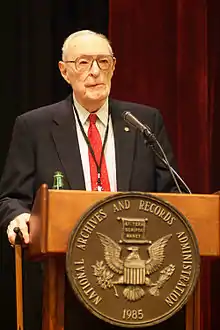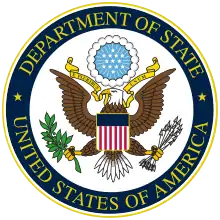Harlan Cleveland
Harlan Cleveland (January 19, 1918 – May 30, 2008) was an American diplomat, educator, and author. He served as Lyndon B. Johnson's U.S. Ambassador to NATO from 1965 to 1969, and earlier as U.S. Assistant Secretary of State for International Organization Affairs from 1961 to 1965. He was President of the University of Hawaii from 1969 to 1974, President of the World Academy of Art and Science in the 1990s, and Founding Dean of the University of Minnesota's Hubert H. Humphrey Institute of Public Affairs. Cleveland also served as Dean of the Maxwell School of Citizenship and Public Affairs at Syracuse University from 1956 to 1961.[1]
Harlan Cleveland | |
|---|---|
 Harlan Cleveland in DC, 2006 | |
| 6th United States Permanent Representative to NATO | |
| In office September 1, 1965 – June 11, 1969 | |
| President | Lyndon B. Johnson Richard Nixon |
| Preceded by | Thomas K. Finletter |
| Succeeded by | Robert Ellsworth |
| Assistant Secretary of State for International Organization Affairs | |
| In office February 20, 1961 – September 18, 1965 | |
| President | John F. Kennedy Lyndon B. Johnson |
| Preceded by | Francis O. Wilcox |
| Succeeded by | Joseph J. Sisco |
| Personal details | |
| Born | January 19, 1918 New York City, New York |
| Died | May 30, 2008 (aged 90) Sterling, Virginia |
| Political party | Democratic |
He was born in New York City to Stanley Matthews Cleveland and Marian Van Buren. His siblings were Harold van Buren Cleveland, an economist, Anne Cleveland White, an artist, and Stanley Cleveland, a diplomat. He attended Phillips Andover Academy and graduated from Princeton University in 1938. He was a Rhodes Scholar at Oxford University in the late 1930s. He was an early advocate and practitioner of online education, teaching courses for the Western Behavioral Sciences Institute (WBSI) and Connected Education in the 1980s and early 1990s.
He authored twelve books, among his best-known are The Knowledge Executive (1985) and Nobody in Charge: Essays on the Future of Leadership (2002).[2] He also published hundreds of journal and magazine articles.[3] His final published writing was the opening chapter for "Creating a Learning Culture: Strategy, Technology, and Practice" (2004) entitled, "Leading and learning with nobody in charge." [4]
He was awarded 22 honorary degrees, the U.S. Presidential Medal of Freedom, Princeton University's Woodrow Wilson Award, the Peace Corps' Leader for Peace Award, and the American Whig-Cliosophic Society's James Madison Award for Distinguished Public Service. He was the co-winner (with Bertrand de Jouvenel) of the 1981 Prix de Talloires, an international award for "accomplished generalists". He was a trustee of the Chaordic Commons.[5]
See also
References
- Nishimoto, Warren; Cleveland, Harlan (1996). "Interview with Harlan Cleveland" (PDF). Archived from the original on 8 November 2020. Retrieved 8 November 2020. Cite journal requires
|journal=(help) - "Harlan Cleveland". www.goodreads.com.
- "World Future Society". World Future Society.
- "Creating a Learning Culture: History of economic thought and methodology". Cambridge University Press. Retrieved November 8, 2020.
- http://www.guidestar.org/ViewPdf.aspx?PdfSource=0&ein=36-3964557
External links
- Club of Rome
- Cleveland on Leadership, an article from THE FUTURIST magazine
- International Leadership Forum
| Government offices | ||
|---|---|---|
| Preceded by Francis O. Wilcox |
Assistant Secretary of State for International Organization Affairs February 20, 1961 – September 18, 1965 |
Succeeded by Joseph J. Sisco |
